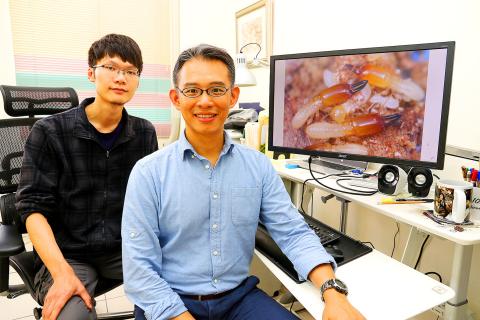A research team led by National Chung Hsing University Department of Entomology associate professor Lee Hou-feng (李後鋒) was the first to name an undocumented termite species found in eastern Taiwan.
The discovery represented the last piece of the puzzle of termite taxonomy, Lee said yesterday, adding that he is part of a transnational team that includes members of the department, National Taiwan University, as well as foreign academics in the Czech Republic, Belgium and China.
Part of the Stylotermitidae family, the species is an intermediate between the Kalotermitidae and Rhinotermitidae families, he said.

Photo: Copy by Tsai Shu-yuan, Taipei Times
Once found worldwide, the Stylotermitidae can now only be found in Asia, he said, adding that scientific records on the species have been scarce since the 1980s.
The team has named it Stylotermes halumicus, Lee said, borrowing the word “halum” from the Bunun word for “pangolin.”
He said this was to thank the Bunun for their assistance in a pangolin conservation project hosted by National Pingtung University of Science and Technology.
The species was found in the trunk of a living tree in Taitung County’s Luanshan (鸞山) area, subverting the established notion that termites live in withered, dead trees or soil, he said.
Its unusual habitat might be why it was never documented in Taiwan over the past centuries, Lee said.
When the researchers collected the species in 2014, they assumed it was similar to the termites found in households, only bigger, team member and doctoral student Liang Wei-ren (梁維仁) said.
After examining its biological traits, the team learned that it is not one of the known termite species in Taiwan, he said.
Its evolution level is situated between the Kalotermitidae and Rhinotermitidae families, which vary widely in their respective habitats and impact on human life, he said.
Kalotermitidae often live in withered branches, with hundreds of termites in a colony; Rhinotermitidae live underground, with each colony housing up to 100,000 insects and can cause big economic losses if they are active in buildings, he said.
What happened between the two evolution stages is a long-term question for entomologists, to which their discovery might provide an answer and allow Taiwan to play a more important role in global termite research, he added.
The team’s findings have been published in the journals the Annals of the Entomological Society of America in 2017 and Invertebrate Systematics last year.

Taiwan’s Liu Ming-i, right, who also goes by the name Ray Liu, poses with a Chinese Taipei flag after winning the gold medal in the men’s physique 170cm competition at the International Fitness and Bodybuilding Federation Asian Championship in Ajman, United Arab Emirates, yesterday.

Costa Rica sent a group of intelligence officials to Taiwan for a short-term training program, the first time the Central American country has done so since the countries ended official diplomatic relations in 2007, a Costa Rican media outlet reported last week. Five officials from the Costa Rican Directorate of Intelligence and Security last month spent 23 days in Taipei undergoing a series of training sessions focused on national security, La Nacion reported on Friday, quoting unnamed sources. The Costa Rican government has not confirmed the report. The Chinese embassy in Costa Rica protested the news, saying in a statement issued the same

A year-long renovation of Taipei’s Bangka Park (艋舺公園) began yesterday, as city workers fenced off the site and cleared out belongings left by homeless residents who had been living there. Despite protests from displaced residents, a city official defended the government’s relocation efforts, saying transitional housing has been offered. The renovation of the park in Taipei’s Wanhua District (萬華), near Longshan Temple (龍山寺), began at 9am yesterday, as about 20 homeless people packed their belongings and left after being asked to move by city personnel. Among them was a 90-year-old woman surnamed Wang (王), who last week said that she had no plans

TO BE APPEALED: The environment ministry said coal reduction goals had to be reached within two months, which was against the principle of legitimate expectation The Taipei High Administrative Court on Thursday ruled in favor of the Taichung Environmental Protection Bureau in its administrative litigation against the Ministry of Environment for the rescission of a NT$18 million fine (US$609,570) imposed by the bureau on the Taichung Power Plant in 2019 for alleged excess coal power generation. The bureau in November 2019 revised what it said was a “slip of the pen” in the text of the operating permit granted to the plant — which is run by Taiwan Power Co (Taipower) — in October 2017. The permit originally read: “reduce coal use by 40 percent from Jan.